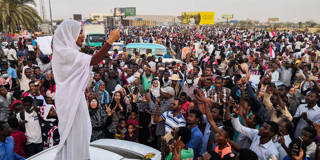The pandemic has wiped out decades of progress toward gender equality, with the most vulnerable groups – such as displaced women and girls – being hit the hardest. Young women and girls continue to fight for their rights, but they cannot overcome the powerful forces working against them alone.
DAKAR – Sudanese protester Alaa Salah became a symbol of her country’s revolution after standing atop a car, dressed in white, and singing to her fellow demonstrators. Ugandan climate-justice activist Vanessa Nakate went from protesting alone at the gates of her country’s parliament to demanding action from world leaders at the United Nations. Senegalese activist Oumou has harnessed digital tools to start taboo-breaking conversations about intimate health, sexuality, contraception, and period poverty.
These young women are fighting for better lives for themselves, their communities, and the world – and they are not alone. Thousands of girls and young women in Africa and around the world are fighting to change the power dynamics that perpetuate inequality and prevent marginalized groups from exercising their fundamental rights. They are making speeches, creating nonprofits and community programs, and participating in marches to catalyze transformative change. This is good news for everyone: countless studies have shown that when girls and women are empowered, entire communities benefit.
But hard-won gains on gender equality are now in jeopardy. The COVID-19 pandemic has undone years of progress on poverty reduction and fueled a sharp rise in inequality, with disproportionate consequences for girls and women.

DAKAR – Sudanese protester Alaa Salah became a symbol of her country’s revolution after standing atop a car, dressed in white, and singing to her fellow demonstrators. Ugandan climate-justice activist Vanessa Nakate went from protesting alone at the gates of her country’s parliament to demanding action from world leaders at the United Nations. Senegalese activist Oumou has harnessed digital tools to start taboo-breaking conversations about intimate health, sexuality, contraception, and period poverty.
These young women are fighting for better lives for themselves, their communities, and the world – and they are not alone. Thousands of girls and young women in Africa and around the world are fighting to change the power dynamics that perpetuate inequality and prevent marginalized groups from exercising their fundamental rights. They are making speeches, creating nonprofits and community programs, and participating in marches to catalyze transformative change. This is good news for everyone: countless studies have shown that when girls and women are empowered, entire communities benefit.
But hard-won gains on gender equality are now in jeopardy. The COVID-19 pandemic has undone years of progress on poverty reduction and fueled a sharp rise in inequality, with disproportionate consequences for girls and women.